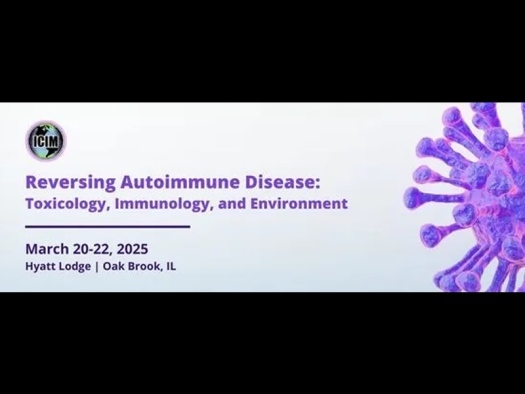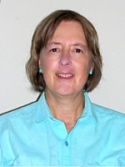The conference began with an all-day workshop given by Nasha Winters, ND, entitled “Evaluating the Terrain and Navigating the Autoimmune Landscape.” Dr Winters (and others in this conference) talked about the need to regulate the terrain. The terrain is the underlying condition of the body that keeps it healthy or susceptible to disease. She cited many studies showing that people who develop autoimmune disease or cancer may have underlying infections, mold or heavy metal exposure, metabolic dysfunction, chronic stress or other conditions that negatively impact the terrain. Genetic SNPs and the condition of the microbiome are also added to the mix. The key to achieving remission involves cleaning up the diet, clearing toxins out of the body, exercising, working on underlying trauma and developing a more positive outlook. She referred to various blood test markers that can be used to identify/ follow the process of disease and remission. She discussed different strategies and protocols for balancing the terrain and regaining one’s health.
On Friday 3/21, the day began with Aristo Vojdani, PhD, MSc, CLS, and his topic of “Predicting and” “Preventing Autoimmunity”. Dr Vojdani noted the rate of autoimmune disease (as depicted by positive ANA markers in the population) has increased from 7% in the 1970’s to over 40% in 2012.He discussed his work in developing test markers for autoimmune diseases and other metabolic issues. He noted that autoimmune disease typically evolves on a continuum from Healthy to Silent Stage to Advanced Stage and this can take anywhere from 2 to 20 years. Treating advanced stage autoimmune disease can be challenging, but testing that identifies issues in earlier stages can make the condition easier to treat.
Robert Verkerk, PhD, MSc, BSc, DIC, FACN presented Hormesis and Autoimmunity: When the Dose Poisons or Heals. The term Hormesis developed from the Arndt-Schulz rule that states for every substance, small doses can stimulate, moderate doses inhibit and large doses kill. In a healthy body, small doses of toxins are dealt with by the body’s adaptive stress response. With too much exposure to toxins and stressors the body loses its ability to self-regulate. This loss of self-tolerance leads to tissue damage and inflammation. Dr Verkerk identified several pathways where this occurs and leads to autoimmune disease. He suggested clinical approaches to restoring the body to homeostasis and improving resilience.
In his talk “Infectious Etiologies of Autoimmune Diseases:” David Brownstein, MD, discussed his long-term work with arthritis, most of which he classified as auto-immune. The medical establishment’s approach to arthritis is to suppress symptoms. He believes that much autoimmune arthritis and many other diseases are caused by an underlying pathogen. Mycoplasma infections are common and can be treated successfully with antibiotic therapy. He discussed several studies where this has been done as well as noting various natural therapies that could help.
In “Triggers of Autoimmunity: Mycotoxins, Diagnostics and Treatment Methods,” Dr Andrew W Campbell, MD. cited a Scientific American article suggesting that mycotoxins might soon emerge as the next deadly plague. He noted that “mold” can contain many different mycotoxins. Most people have low levels of mycotoxins in their urine, because low levels are common in many foods and factors like creatine levels can impact the test. ELISA testing is better, antibody testing the best. Mycotoxins stimulate inflammation and can cause many diseases, He showed information that linked mycotoxins to Lupus, MS, Hashimoto’s Disease, Chronic Fatigue disorders, autism, and others. Treatment strategy involves removing the toxins with antifungals and building up the health of the body with various natural protocols.
In “The Potential Role of Lyme Disease in Auto-immunity”, Nicola McFadzean Ducharme, ND, discussed the etiology of Lyme, which can be caused by many different pathogens and possibly transmitted through vectors other than ticks: e.g., mosquitoes, lice, fleas, etc. Particular organisms can exacerbate certain symptoms. She recommends 2 step testing with ELISA and Western Blot. Treatment strategies include targeting the pathogen, detoxifying affected pathways, and checking for co-infections, including mold.
The day concluded with a panel of the presenters, addressing questions and answers from the conference attendees. concluded the day with day’s speakers answering questions
On Saturday. Christina Parks, PhD, gave a presentation on “Strategies for Walking Back Chronic Immune Activation: A Powerful Root Cause in the Development of Autoimmunity and Cancer, Including Clearing Spike Protein from the Body.” She discussed the “Self-Organized Criticality Theory of Autoimmune Disease” which is when the overstimulation of the immune system beyond its self-organized criticality inevitably leads to system autoimmunity. Studies suggest that repeated exposure to a pathogen may induce this as well as various adjuvants in vaccines. When the “steady-state” immune system is disrupted, problems can arise. She also discussed the effects of spike protein, how it affects the body and what can be done to treat it.
Meleni Aldridge, BSc, Nut Med Dip, cPNI Cert LTFHE, specializes in psychoneuroimmunology. In her talk: “Thyroid in Context: Understanding the Evolutionary Role of the “Permissive Organ” in Autoimmune Thyroid Disease ” she notes how every disease begins with a loss of connection between the brain and the immune system. She discussed the impact of leptin resistance, stress and emotional triggers on thyroid dysfunction and thyroid regeneration strategies.
In “Optimizing Terrain to Control/Reverse Autoimmunity”, Richard Ng, MD, maintains that autoimmune disease is not due to flawed genetics or confused immune systems, but chaos in the terrain that stems from over-toxicity. The terrain becomes a swamp. Adrenal fatigue, stress, toxic thoughts and relationships can contribute to the problem. He discussed blood markers to watch as well as nutritional and lifestyle factors to clean up the “swamp”.
Legal Update: John Richardson, JD, discussed current legal issues and the importance of having a thorough disclosure form.
In her presentation “Fake Food, Children, and the Links to Autoimmunity”, Michelle Perro, MD, talked about the increasing levels of metabolic syndrome, celiac disease, asthma, and other chronic disorders in children. The impact of ultra processed foods, GMOs, herbicides, sugar, food additives and poor soil on our food supply has had a devastating effect on human health. All autoimmune diseases in children are increasing. Despite concern about the effects of food animals on the environment, products like Biomilq and lab grown meat are not the solution as they are full of unhealthy ingredients. Dr Perro also discussed how glyphosate impacts the gut and destroys bacteria that help absorb Vitamin D, a critical factor in a healthy immune system.
In “Differentiating Mast Cell Activation Syndrome from Autoimmune Disease- A Clinical Approach to Etiology, Diagnosis, and Management, ”Dr Martin Dubravec, MD, discussed Mast Cell Activation Syndrome and how to distinguish it from Autoimmune disease. He classifies MCAS as an allergic disease, or an abnormal (mast cell} reaction to typically harmless environmental substances. Receptors on Mast Cells are activated by IgE and other factors, creating mastocytosis which leads to chronic inflammation and other symptoms
The day concluded with a panel of the presenters, addressing questions and answers from the conference attendees



